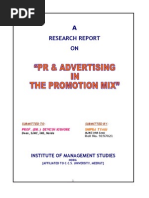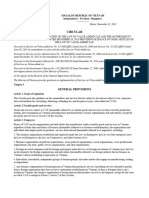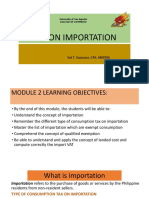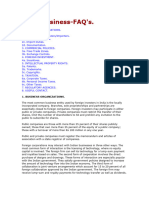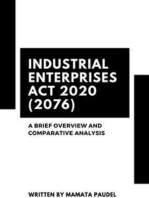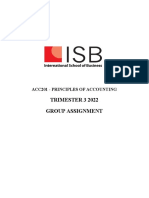I. Import Policy, Regulations and Procedure A. General: Traders' Manual For Least Developed Countries: BHUTAN
I. Import Policy, Regulations and Procedure A. General: Traders' Manual For Least Developed Countries: BHUTAN
Uploaded by
1986neerajCopyright:
Available Formats
I. Import Policy, Regulations and Procedure A. General: Traders' Manual For Least Developed Countries: BHUTAN
I. Import Policy, Regulations and Procedure A. General: Traders' Manual For Least Developed Countries: BHUTAN
Uploaded by
1986neerajOriginal Title
Copyright
Available Formats
Share this document
Did you find this document useful?
Is this content inappropriate?
Copyright:
Available Formats
I. Import Policy, Regulations and Procedure A. General: Traders' Manual For Least Developed Countries: BHUTAN
I. Import Policy, Regulations and Procedure A. General: Traders' Manual For Least Developed Countries: BHUTAN
Uploaded by
1986neerajCopyright:
Available Formats
Traders’ Manual for Least Developed Countries: BHUTAN
_______________________________________________________________________________________________________
Part Two
SELLING TO BHUTAN
I. IMPORT POLICY, REGULATIONS AND PROCEDURE
A. General
The Ministry of Trade and Industry and the Ministry of Finance are the authorities
which formulate import policy and implement import control measures. Bhutan, with its
population of less than 700,000 inhabitants, has a small internal market and until recently had
relatively limited foreign trade except for its close trading relationship with India. Bhutan
economy is highly dependent on imports especially for infrastructure equipments such as
machinery, computers and parts, passenger motorcars, diesel, and trucks.
Imports from countries other than India, to be referred to as imports from third
countries, are regulated by the Department of Trade of the Ministry of Trade and Industry
since 1999.
B. Import approval
No approval is required to import from India, but an import permit must be sought in
order to import from India excisable goods namely alcoholic beverages including beer, spirits
used in distilleries, and narcotics and psychotropic substance for hospital use.
Although there are no official import approvals to be sought for import of goods from
third countries, the importer can only import goods in respect of which it has registered as an
import house.
The sale of foreign exchange for payment of import of goods into Bhutan is only
authorized to holder of import licences in accordance with Clause 11 of the Foreign
Exchange Regulations of Bhutan, 1997.
In addition, there is a list of prohibited goods and a list of restricted goods that require
special permission for imports (see tables 1 and 2).
C. Licensing, quotas and prohibitions
1. Licensing
Imports from countries other than India require Import License issued by the
Department of Trade under the Ministry of Trade and Industry.
In order to apply for an Import License, the importer (not an individual, except for
cases regulated by the Customs Rules and Regulations) needs to comply with the following
criteria:
• Be a Bhutanese national or a company registered in Bhutan;
• Have a valid trade license (free-of-charge application, and renewable for 12
months) for the goods to be imported; and
• Have a tax clearance certificate
_______________________________________________________________________________________________________
Part Two: Selling to Bhutan 8 of 33
Traders’ Manual for Least Developed Countries: BHUTAN
_______________________________________________________________________________________________________
Also the importers should take note that:
• A separate import license is required for each consignment and issued in a
number of copies depending on the customs point of entry into Bhutan;
• Import licenses are to be issued for c.i.f. value; and
• An Import License is normally valid for 12 months and extendable.
2. Quotas
There is no quota restriction on imports from India or third countries into Bhutan.
However, the imports from India of liquefied petroleum gas, kerosene and certain kinds of
fertilisers are restricted by a bilateral understanding between Bhutan and India.
3. Import prohibitions
The prohibition to import the following items called negative goods is valid for all
countries independently from their origin.
Table 1. Prohibited goods
· Narcotics and psychotropic drugs and substances (see annex).
· Pornography and pornographic materials.
· Goods specially prohibited by law or regulation, or international conventions and treaties
to which Bhutan is a signatory.
· Second hand or used vehicles other than those imported by privileged personnel of diplomatic
missions and international organizations under conditions specified by the Customs Act, or by
the Royal Government from time to time.
Source: Sales Tax, Customs and Excise Act of the Kingdom of Bhutan 2000, Ministry of Finance.
4. Restricted goods
The imports of the following goods are restricted and required a special permission
(in original) issued by the concerned agencies for such imports as listed in the table 2.
Table 2. Restricted goods
Goods under restricted imports Concerned agencies
Arms and ammunition Royal Bhutan Army
Chemicals and fertilizers Ministry of Agriculture
Drugs and pharmaceutical products Ministry of Health and Education/Ministry of
Agriculture
Explosives and explosive devices Ministry of Home Affairs
Gold and silver in excess of free allowance Royal Monetary Authority of Bhutan
Goods for which there is no market within Ministry of Trade and Industry
the country
Industrial and toxic waste and residues National Environment Commission/Ministry of
Trade and Industry
Live animals and their products or by- Ministry of Agriculture
products
Plants and plant materials Ministry of Agriculture
Plastic packing materials Ministry of Trade and Industry
Scraps National Environment Commission
_______________________________________________________________________________________________________
Part Two: Selling to Bhutan 9 of 33
Traders’ Manual for Least Developed Countries: BHUTAN
_______________________________________________________________________________________________________
Goods under restricted imports Concerned agencies
Used or second hand goods, machinery, Ministry of Trade and Industry
vehicles, equipment and parts thereof
Wireless and remote sensing Bhutan Telecommunications Authority
telecommunication and broadcasting
equipment
Any other goods which are restricted by any Ministry of Trade and Industry
other laws and regulations in force
Source: Sales Tax, Customs and Excise Act of the Kingdom of Bhutan 2000, Ministry of Finance.
D. Import requirements
Goods are imported from India or third countries on the condition that they will be
used or sold within the territory of Bhutan.
The imports of foods items are subject to special requirements in conformity with the
Food Act to be approved by the Parliament.
The imports of animals, plants and their products are subject to sanitary and
phytosanitary measures according to the Plant Quarantine Act 1993. The plant and animal
quarantine checkpoints are located at the main entry points of the country namely
Phuntsholing, Samdrup, Jongkhar, Gelepu and Paro airport. The import of plants has also to
comply with the Forest and Conservation Act 1995.
In the case of raw materials imported and to be processed in Bhutan, the final
products must have a value addition of a minimum of 40 per cent, which would be reviewed
in accordance with the SAARC Preferential Trading Arrangement (SAPTA).
E. Packing and labelling requirements
The Bhutan Package Commodities Rules and Regulations 1995, issued by the
Ministry of Trade and Industry, regulate the sales, storage and distribution of package
commodities in Bhutan. It also applies to goods produced in India, Bangladesh, and Nepal.
Each package commodity shall bear a label secured affixed and indicating:
• Name and address of the manufacturer, or that of the packer;
• Generic name of the product;
• Net quantity contained in the package (weight, measure or number); and
• Maximum retail price.
F. Inspections
Bhutan has not adopted the pre-shipment inspection regime.
G. Participation in multilateral, regional and commodity agreements
The first free trade and commerce agreement between Bhutan and India was signed in
January 1972. This Agreement and its protocol were last renewed on 2 March 1995 and
would remain valid for the next 10 years. It provides trade without the applications of duties
between the two countries.
_______________________________________________________________________________________________________
Part Two: Selling to Bhutan 10 of 33
Traders’ Manual for Least Developed Countries: BHUTAN
_______________________________________________________________________________________________________
In 1980, Bhutan signed an agreement on trade with Bangladesh. In May 2003, it was
replaced by a five-year tariff concession agreement between the two countries. It provides
concessions on duties for a range of product lines.
Bhutan is also discussing trade agreement with Nepal and Thailand with whom
Bhutan has direct air links.
Bhutan is a member of the South Asian Preferential Trading Arrangement (SAPTA).
II. TARIFF SCHEDULE - CUSTOMS
A. General
Bhutan joined the World Customs Organization in 2002 and is in the process of
implementing the 2002 Harmonized Commodity Description and Coding System (HS).
Bhutanese import tariffs are regulated by the Department of Revenue and Customs under the
Ministry of Finance.
Contact point: Mr. Sangay Zam or Mr. Sonam Tenzin
Department of Revenue and Customs (HQ)
Ministry of Finance
Thimphu, Bhutan
Tel: (975 2) 322319, 324357
Fax: (975 2) 323608
E-mail: drchq@mof.gov.bt
B. Classification
The Harmonized System classification is now being used in Bhutan.
C. Customs duties
Bhutan Customs Rules and Regulations and the Customs Tariff Schedule were firstly
introduced in 1996, and revised in 2001. The Regional Revenue and Customs Office under
the Ministry of Finance is in charge of customs duty collection.
Goods imported from India are not subject to customs tariff rates. Goods imported
from third countries are subject to customs tariff rates ranging from 0 to 30 per cent. The
majority of items are subject to a duty of 10, 20 or 30 per cent rate. Beer and non-alcoholic
beverages are levied at 50 per cent, while tobacco and alcoholic beverages have a 100 per
cent rate.
Customs duty is calculated on ad valorem basis. The valuation of imported goods is
based on the cost, insurance and freight (c.i.f.) at entry point in Bhutan. Re-import of goods
is allowed free of customs duty and taxes if a declaration is made to Customs authorities at
the time of export and on re-importation. Should there be any alteration or repair of the
goods, such alteration and repair is liable to customs duty and taxes.
_______________________________________________________________________________________________________
Part Two: Selling to Bhutan 11 of 33
Traders’ Manual for Least Developed Countries: BHUTAN
_______________________________________________________________________________________________________
Temporary import of goods is free of duty and taxes, against a bond/bank
guarantee/or cash security, for period of up three 3 months, if the goods are not used for
commercial purposes, and will be re-exported out of Bhutan.
As a member of SAPTA, Bhutan follows SAPTA’s rules of origin that applies
preferential tariff concessions if the products have at least 50 per cent free on board (f.o.b.)
value originating from the SAPTA member countries. The list of products on which tariff
concessions were granted by Bhutan under SAPTA First, Second and Third Round of Trade
Negotiations is available at: www.saarc-sec.org/economic/sapta/BHUTAN-merged-CNS.pdf.
Bhutan granted tariff concessions on 21 new products and deeper tariff concessions on 24
products to other SAARC member countries for the import of their products into Bhutan, see:
http://www.mof.gov.bt/drc/download/saarc_2003.pdf.
D. Taxes and surcharges
Imported goods are subject to Bhutan sales tax, which ranges from 0 to 15 per cent,
except for alcoholic beverages and tobacco products that have a 50 per cent rate. Bhutan
sales tax is collected either at the time of import or the time of sale. When collected at the
point of entry, valuation of goods is based on the f.o.b. price. When collected at the point of
sale, valuation is based on the sales price.
There are also an agency commission of 1 per cent on c.i.f. value on goods cleared by
the department and a service charge of 0.25 per cent on c.i.f. value of goods cleared by the
customs clearing agents.
Beer importers are also liable for an excise permit fee at Nu 150 per permit.
There are two categories of exceptions:
• The imports of industrial raw materials, plant, machinery and their spare parts are
exempted from customs duty and Bhutan sales tax if the final products have at
least 40 per cent value addition, and convertible currency earned during a year by
the company or business from exports of goods covers at least the cost of
imported raw materials and components;
• Import of any goods as gift through a foreign post parcel up to an assessed value
of US$ 100 shall be exempted from the Customs duty and taxes and no import
license/permit shall be necessary provided that:
- A person resident in Bhutan does not receive such gifts more than twice a
year;
- Such a gift does not consist of alcohol, alcohol beverages or any prohibited or
restricted goods;
- Such a gift is sent to a private person by or on behalf of another private person
resident abroad; and
- Such a gift consists only of goods for personal use and nature and quantity of
the goods imported are such that it is not of commercial nature.
_______________________________________________________________________________________________________
Part Two: Selling to Bhutan 12 of 33
Traders’ Manual for Least Developed Countries: BHUTAN
_______________________________________________________________________________________________________
III. FOREIGN EXCHANGE REGIME
A. General
The Royal Monetary Authority is the central bank overseeing Bhutan monetary
policies and foreign exchange conditions. The Foreign Exchange Regulations of Bhutan
were introduced in 1997. They apply only to transactions covering the utilization of specific
foreign exchange allowances and to schemes available to nationals of the country. The
foreign exchange regime has a strict control on payment in hard currency.
Royal Monetary Authority (RMA)
P.O.Box 154
Thimphu, Bhutan
Tel: (975 2) 322540
Fax: (975 2) 322847
B. Currency convertibility
Bhutanese ngultrum is not convertible. The Bhutanese currency is pegged to the
Indian rupee at par, and the rupee can be circulated freely in Bhutan despite that the ngultrum
is the only legal tender currency in the country.
C. Money and finance measures
Generally, a licensed importer is allowed to purchase foreign exchange from
authorised banks for payment against the goods specified in the licence.
D. Banking
There are only two commercial banks in Bhutan with branches around the country:
the Bank of Bhutan and the Bhutan National Bank. In general, there are exchange counters
at the airport, hotels and the two main cities of Thimphu and Phuentsholing.
Bank of Bhutan (BOB) Bhutan National Bank (BNB)
P.O. Box 75 P.O. Box 439
Phuentsholing, Bhutan Thimphu, Bhutan
Tel: (975 5) 252225 Tel: (975 2) 322767, 325297, 325191
Fax: (975 5) 252641 Fax: (975 2) 323601
E-mail: bnbtphu@druknet.bt
tashibnb_bht@hotmail.com
URL: www.bnb.com.bt
Bhutan also has other financial institutions to assist and promote the development of
the domestic industries. The Bhutan Development Finance Corporation provides services to
small and medium-sized industrial and agricultural producers. The Royal Insurance
Corporation of Bhutan focuses on both life and general insurance and manages the
government Employees Provident Fund.
_______________________________________________________________________________________________________
Part Two: Selling to Bhutan 13 of 33
Traders’ Manual for Least Developed Countries: BHUTAN
_______________________________________________________________________________________________________
Bhutan Development Finance Corporation The Royal Insurance Corporation of
(BDFC) Bhutan (RICB)
P.O. Box 256 P.O. Box 77
Thimphu, Bhutan Phuentsholing, Bhutan
Tel: (975 2) 322579, 324162 Tel: (975 5) 252368, 252509
Fax: (975 2) 323428 Telex: 09890 305 RICB PLG BT
Fax: (975 2) 223677 (Thimphu)
URL: www.ricb.com.bt
IV. DOCUMENTS
All pre-numbered forms should be purchased from Kuensel Corporation, as web-
downloaded forms are not accepted. The following documents shall be submitted to the
concerned Regional Revenue and Customs Office (RRCO), or the Bhutanese Revenue and
Customs Liaison and Transit Office (LTO) in Kolkata, India.
A. Documents required for imports
Number of
Document Responsible Body Form No.
copies
Application form for 1 Department of Revenue and GP-Form I
Bhutan tax sale/duty Customs
refund, if applicable
Bhutan sales tax exemption 1 Department of Revenue and ST-Form II
certificate, if applicable Customs
Bill of lading/air waybill 3 Shipping company/airline
company
Certificate of origin 1 Department of Trade
Customs import declaration 1 Department of Revenue and Import from India
form Customs ST-Form I
Customs import declaration 1 Department of Revenue and Import from third
form Customs countries
CD Form III
Import duty exemption 1 Department of Revenue and CD Form I
certificate, if applicable Customs
Import license 4/5/6 Department of Trade
Invoice 8 Importer
Marine/air/transit insurance 1 Insurance company
policy, wherever applicable
Packing list 1 Exporter
Special permits for 1 Relevant departments Originals
restricted goods, if
applicable
Transit declaration, if 1 Department of Revenue and GP-Form VI
applicable Customs
Source: Rules and Procedures for Imports from Third Countries, Ministry of Trade and Industry.
B. Special requirements
Imports of plants, animals and their products have to comply with the phytosanitary
measures according to the Plant Quarantine Act, 1993.
_______________________________________________________________________________________________________
Part Two: Selling to Bhutan 14 of 33
Traders’ Manual for Least Developed Countries: BHUTAN
_______________________________________________________________________________________________________
V. MARKETING AND DISTRIBUTION
A. Market regulations
Since 1992, the role of wholesale and retail services has become more significant
when the royal government started to open up the market. Both wholesale and retail dealers
need to apply for licences to operate. A business operator can be licensed as both wholesale
and retail dealer. However these two services have to be operated in different outlets.
B. Product standards
Under the India-Bhutan Agreement on Operation Certification Scheme, 1998,
products bearing the Bureau of Indian Standards (BIS) mark are recognized in Bhutan, and in
return, Bhutanese industries may apply and obtain BIS mark.
For goods imported from countries other than India, standardization requirements
depend on the agreement between the Bhutanese importers and the foreign sellers on case-
by-case basis.
In 2000, Bhutan became a member of the Codex Alimentarius Commission.
Therefore standards relating to food products shall meet the standards stipulated in the Food
Act once approved by the National Assembly. Bhutan has not yet joined the International
Organization for Standardization.
C. Port facilities and trading routes
Bhutan is a landlocked country, thus most of its imports are transited through Indian
ports via Kolkata, then transported on land to Bhutan. Indian customs at Kolkata are
authorized to clear goods imported to Bhutan. The other trading route is through Bhutan’s
only international airport of Paro.
Imports and exports of goods between India and Bhutan have to go through one of the
five designated customs points: Phuentsholing, Samtse, Thimpu (Paro airport), Gelephu, or
Samdrup Jongkha.
Imports and exports of goods from third country have to transit via India. The
authorized entry and exit points between India and Bhutan are the following:
Bhutanese side Indian side
Phuentsholing Jaigaon, West Bengal
Samtse Chamurchi, West Bengal
Gelephu Hathisar, Assam
Sarpang Ulta Pani, Assam
Samdrup Jongkha Darranga, Assam
Paro Kolkata and Delhi
Ministry of Trade and Industry of Bhutan and the Asian Development Bank are
considering the possibility to develop an industrial estate in Pasakha and a dry port in
Phuentsholing.
_______________________________________________________________________________________________________
Part Two: Selling to Bhutan 15 of 33
Traders’ Manual for Least Developed Countries: BHUTAN
_______________________________________________________________________________________________________
VI. GOVERNMENT PROCUREMENT AND STATE TRADING
ORGANIZATIONS
A. Government procurement
Under the provisions of the Financial Manual 2001 of the Ministry of Finance, open
bidding procedure is generally used as method of government procurement.
Depending on the value of the contract, limited tender may be used for value between
US$ 2,000 and US$ 10,000 and open bidding for value over US$ 10,000. Limited tender is
also used in case of limited available time to follow the procedures for the open bidding
procedure. In case certain capacities are not available in Bhutan, then international
procurement may be necessary.
Invitations for bids are published in the mass media and posted on the Ministry of
Finance website. There is a minimum time limit for submission of bids which is 30 days for
open bidding and 15 days for limited bidding.
Contact:
Procurement, Ministry of Finance
Jurminla Secretariat
Thimphu, Bhutan
Tel: (975 2) 322223, 322514, 322271 Ext.104
Fax: (975 2) 323154
E-mail: julmin@mof.gov.bt
URL: www.mof.gov.bt
B. State trading organizations
With the opening of the country, efforts have taken place to privatize the trading
activities, with the exception of three state trading organizations, which hold exclusive rights
to only selected products of all the goods that they trade.
(a) The State Trading Corporation of Bhutan (STCB) does not have any more the
monopoly for government procurement as now it goes through bidding process. The
Ministry of Finances still has 51 per cent of the shares after the privatization that took place
in 1997. STCB remains the exclusive organization to import and export sensitive items such
as explosives which requires a special permit from the Ministry of Home Affairs. For the
other items, STCB has to compete with the others although it remains the main importer of
steel, bitumen, vehicles and spare parts, vitamins, computer and office equipment.
State Trading Corporation of Bhutan (STCB)
P.O. Box 76
Phuentsholing, Bhutan
Tel: (975 5) 252286, 252610
Fax: (975 5) 252619
E-mail: stcbl@druknet.net.bt
_______________________________________________________________________________________________________
Part Two: Selling to Bhutan 16 of 33
Traders’ Manual for Least Developed Countries: BHUTAN
_______________________________________________________________________________________________________
(b) The Druk Seed Corporation (DSC) has the exclusive right for the procurement
and import of fertilizers and butachlor (herbicide). It imports seeds and seedling that are not
produced in Bhutan. It also supplies plants and planting materials.
Druk Seed Corporation
Chundudingkha
Paro, Bhutan
Tel: (975 8) 271465, 271462
Fax: (975 8) 271206
E-mail: drukseed@druknet.net.bt
(c) The Forestry Development Corporation Ltd. (FDC) is 100 per cent government
owned and holds the exclusive right to log, extract, process and trade of timber and timber
products in both domestic and international market. It carries out reforestation programmes
as well as research and development work.
Forestry Development Corporation Ltd. (FDC)
P.O. Box 192
Thimphu, Bhutan
Tel: (975 2) 323834
Fax: (975 2) 325585
VII. PRINCIPAL IMPORT ITEMS
Bhutan principal trade partner remains India, although there is a tendency to diversify
the origin of the imports as listed in table 3.
Table 3. Direction of imports
(Millions of ngultrum)
1997 1998 1999 2000 2001
India 3,453.6 3,620.0 5,845.3 7,462.6 6,988.8
Japan 841.6 410.2 260.4 305.2 622.2
Singapore 140.0 398.3 997.9 251.4 214.6
United Kingdom 19.5 33.2 31.3 205.4 163.4
Germany 45.4 72.0 0.0 28.3 66.0
United States 30.2 42.7 22.4 34.3 49.0
Thailand* 105.8 290.0
Bangladesh* 49.3 64.7
China* 71.8 15.8
Nepal* 24.7 15.0
Others 447.6 939.9 677.6 567.6 500.7
Total 4,977.9 5,516.4 7,834.9 9,106.3 8,990.2
Source: Department of Revenue and Customs of Bhutan.
* Countries being reported separately from 2000, grouped as others before.
_______________________________________________________________________________________________________
Part Two: Selling to Bhutan 17 of 33
Traders’ Manual for Least Developed Countries: BHUTAN
_______________________________________________________________________________________________________
Table 4. Composition of imports from India
(Millions of ngultrum)
Item 1997 1998 1999 2000 2001
Mineral products 626.0 612.8 840.5 1,227.8 1,512.7
Machinery and mechanical appliances 359.8 520.8 1,094.4 966.9 1,014.0
Base metals and base metals products 271.0 256.1 767.5 791.7 969.2
Cereals, vegetables, fruits, nuts, coffee, tea and spices 412.7 458.1 697.4 502.4 555.6
Products of chemical industries 235.7 224.4 318.3 1,659.3 514.8
Prepared foodstuffs 261.2 306.6 388.6 422.2 503.8
Transport equipment 341.0 295.7 579.1 503.9 454.9
Animal products 122.9 119.1 171.9 209.9 270.6
Vegetable fats and oil 127.6 151.1 161.6 168.6 201.0
Textiles 120.6 146.6 157.1 155.3 168.7
Plastic and rubber products 100.2 113.0 177.6 150.3 157.7
Woodpulp products 94.0 72.9 117.6 148.2 151.4
Wood and wood products 164.5 108.5 110.6 238.8 148.5
Stone, plaster, cement and asbestos products 83.1 111.3 86.7 80.5 145.4
Optical, photographic and measuring equipment 41.1 59.5 63.8 76.7 87.9
Miscellaneous manufactured articles 36.9 45.6 63.7 85.6 77.5
Footwear, headgear and clothing accessories 50.9 16.4 44.6 70.6 49.7
Raw hides and skins 3.9 2.4 4.3 3.5 5.2
Precious and semi-precious metal products 0.3 0.2 0.2 0.3 0.1
Works of art, antiques and special transactions 0.4 0.0 0.0 0.1 0.1
TOTAL 3,453.6 3,621.1 5,845.5 7,462.6 6,988.8
Source: Department of Revenue and Customs of Bhutan.
Table 5. Composition of imports from countries other than India
(Millions of ngultrum)
Item 1997 1998 1999 2000 2001
Machinery, mechanical appliances, base metals 1,244.8 1,157.1 1,667.9 1,268.1 1,539.3
Plastic and rubber products 23.6 118.8 70.3 84.6 131.9
Whiskies and processed food 15.2 43.8 34.4 46.1 77.1
Textiles 26.4 51.5 35.9 43.9 60.2
Miscellaneous manufactured articles 5.5 23.8 9.1 28.1 30.8
Medicines and pharmaceuticals 22.0 79.0 19.6 20.6 24.0
Wood products 21.9 17.3 7.0 12.5 21.7
Woodpulp products 49.0 115.6 26.3 38.1 21.3
Personal effects 27.8 51.3 3.3 1.8 21.1
Products of chemical industries 13.5 62.8 7.5 9.1 19.1
Ceramic and melamine products 18.7 35.4 3.1 0.8 13.3
Trekking equipment, footwear, carpets 4.9 33.3 7.6 5.7 13.0
Vegetable fats and oil 6.0 20.6 13.2 6.0 10.3
Animal products 0.4 2.1 1.0 2.3 7.0
Cereals, vegetables, fruits, nuts, coffee, seeds 0.3 0.5 12.2 3.1 3.4
Tobacco and cigarettes 5.3 5.4 6.4 5.0 3.3
Photographic film and materials 1.3 33.7 0.1 0.4 2.1
Mineral oil and fuel 36.3 40.1 56.9 66.9 1.4
Precious and semi-precious metals 1.6 3.3 7.8 0.5 1.1
TOTAL 1,524.5 1,895.4 1,989.6 1,643.6 2,001.4
Source: Department of Revenue and Customs of Bhutan.
_______________________________________________________________________________________________________
Part Two: Selling to Bhutan 18 of 33
Traders’ Manual for Least Developed Countries: BHUTAN
_______________________________________________________________________________________________________
References for part two: Selling to Bhutan
Ministry of Finance. 2000. Rules on the Sales Tax, Customs and Excise Act of the Kingdom
of Bhutan. http://www.mof.gov.bt/drc/sales_tax.html
Ministry of Trade and Industry. 2000. Rules and Procedures for Imports from Third
Countries..
Ministry of Trade and Industry. 1995. Rules and Regulations for Establishment and
Operation of Industrial and Commercial Ventures in Bhutan.
SAARC Secretariat. Agreement on SAARC Preferential Trading Arrangement (SAPTA),
Annex III.
Wangyal T. 2003. Reconciling Rhetoric and Reality: An Assessment of the Impact of WTO
on Bhutan. (WTO accession document).
Asia Business Daily. http://www.asiabusinessdaily.com
_______________________________________________________________________________________________________
Part Two: Selling to Bhutan 19 of 33
You might also like
- Safeguard Import Duty On Fructose Syrup Products: Mof Reg. 126/2020No ratings yetSafeguard Import Duty On Fructose Syrup Products: Mof Reg. 126/20203 pages
- Chapter3 How To Obtain Registration Under GSTNo ratings yetChapter3 How To Obtain Registration Under GST45 pages
- Export House, Trading House, Star Trading House and Super Star Trading HouseNo ratings yetExport House, Trading House, Star Trading House and Super Star Trading House15 pages
- Nghi Dinh 69 2018 ND CP Quy Dinh Chi Tiet Mot So Dieu Cua Luat Quan Ly Ngoai ThuongNo ratings yetNghi Dinh 69 2018 ND CP Quy Dinh Chi Tiet Mot So Dieu Cua Luat Quan Ly Ngoai Thuong54 pages
- Deemed Exports Under GST- Complete & Detailed Analysis- Taxguru.inNo ratings yetDeemed Exports Under GST- Complete & Detailed Analysis- Taxguru.in12 pages
- Temporary Entry and Prohibited and Restricted ImportsNo ratings yetTemporary Entry and Prohibited and Restricted Imports23 pages
- Government Notification: Imports and Exports Control Act, No. 1 of 1969No ratings yetGovernment Notification: Imports and Exports Control Act, No. 1 of 1969106 pages
- Akuntansi PPH Pasal 22 (Revisi 15 Maret2022)No ratings yetAkuntansi PPH Pasal 22 (Revisi 15 Maret2022)13 pages
- State Control Over Import and Export of GoodsNo ratings yetState Control Over Import and Export of Goods5 pages
- Law On Foreign Trade Management - Only These Articles For DiscussionNo ratings yetLaw On Foreign Trade Management - Only These Articles For Discussion4 pages
- Myanmar Procedures For Export and Import and Customs Clearance100% (2)Myanmar Procedures For Export and Import and Customs Clearance5 pages
- International Marketing Management: TOPIC: India's Trade Policy & Export DocumentationNo ratings yetInternational Marketing Management: TOPIC: India's Trade Policy & Export Documentation6 pages
- Export Import Procedures and Documentation100% (1)Export Import Procedures and Documentation23 pages
- ITC (HS), 2012 Schedule 1 - Import PolicyNo ratings yetITC (HS), 2012 Schedule 1 - Import Policy10 pages
- Define The Person Under GST: Reasons For Prohibition of Importation and Exportation by Union GovtNo ratings yetDefine The Person Under GST: Reasons For Prohibition of Importation and Exportation by Union Govt7 pages
- Export Promotion and Incentives: International Marketing Marzieh Arianfar Bims-University of Mysore APRIL 2013No ratings yetExport Promotion and Incentives: International Marketing Marzieh Arianfar Bims-University of Mysore APRIL 201321 pages
- The Ministry of Finance - The Socialist Republic of Vietnam Independence - Freedom - HappinessNo ratings yetThe Ministry of Finance - The Socialist Republic of Vietnam Independence - Freedom - Happiness20 pages
- Bangladesh Import Policy Order, 2006-2009 - English PDFNo ratings yetBangladesh Import Policy Order, 2006-2009 - English PDF70 pages
- Tax Audit Project Yuviy 190020045 MazarsNo ratings yetTax Audit Project Yuviy 190020045 Mazars17 pages
- Industrial Enterprises Act 2020 (2076): A brief Overview and Comparative AnalysisFrom EverandIndustrial Enterprises Act 2020 (2076): A brief Overview and Comparative AnalysisNo ratings yet
- CHAPTER 4 Part 1 Risks and Rates of ReturnNo ratings yetCHAPTER 4 Part 1 Risks and Rates of Return9 pages
- SAP Business Process Improvement Series - Transfer Pricing and Material Ledger in SAP90% (10)SAP Business Process Improvement Series - Transfer Pricing and Material Ledger in SAP40 pages
- Exchanging Value: Negotiating Technology Licensing AgreementsNo ratings yetExchanging Value: Negotiating Technology Licensing Agreements182 pages
- SFM Equity Additional Practice QuestionsNo ratings yetSFM Equity Additional Practice Questions23 pages
- Safeguard Import Duty On Fructose Syrup Products: Mof Reg. 126/2020Safeguard Import Duty On Fructose Syrup Products: Mof Reg. 126/2020
- Export House, Trading House, Star Trading House and Super Star Trading HouseExport House, Trading House, Star Trading House and Super Star Trading House
- Nghi Dinh 69 2018 ND CP Quy Dinh Chi Tiet Mot So Dieu Cua Luat Quan Ly Ngoai ThuongNghi Dinh 69 2018 ND CP Quy Dinh Chi Tiet Mot So Dieu Cua Luat Quan Ly Ngoai Thuong
- Deemed Exports Under GST- Complete & Detailed Analysis- Taxguru.inDeemed Exports Under GST- Complete & Detailed Analysis- Taxguru.in
- Temporary Entry and Prohibited and Restricted ImportsTemporary Entry and Prohibited and Restricted Imports
- Government Notification: Imports and Exports Control Act, No. 1 of 1969Government Notification: Imports and Exports Control Act, No. 1 of 1969
- Law On Foreign Trade Management - Only These Articles For DiscussionLaw On Foreign Trade Management - Only These Articles For Discussion
- Myanmar Procedures For Export and Import and Customs ClearanceMyanmar Procedures For Export and Import and Customs Clearance
- International Marketing Management: TOPIC: India's Trade Policy & Export DocumentationInternational Marketing Management: TOPIC: India's Trade Policy & Export Documentation
- Define The Person Under GST: Reasons For Prohibition of Importation and Exportation by Union GovtDefine The Person Under GST: Reasons For Prohibition of Importation and Exportation by Union Govt
- Export Promotion and Incentives: International Marketing Marzieh Arianfar Bims-University of Mysore APRIL 2013Export Promotion and Incentives: International Marketing Marzieh Arianfar Bims-University of Mysore APRIL 2013
- The Ministry of Finance - The Socialist Republic of Vietnam Independence - Freedom - HappinessThe Ministry of Finance - The Socialist Republic of Vietnam Independence - Freedom - Happiness
- Bangladesh Import Policy Order, 2006-2009 - English PDFBangladesh Import Policy Order, 2006-2009 - English PDF
- Industrial Enterprises Act 2020 (2076): A brief Overview and Comparative AnalysisFrom EverandIndustrial Enterprises Act 2020 (2076): A brief Overview and Comparative Analysis
- Import of Goods: A Practical Guide for ImportersFrom EverandImport of Goods: A Practical Guide for Importers
- SAP Business Process Improvement Series - Transfer Pricing and Material Ledger in SAPSAP Business Process Improvement Series - Transfer Pricing and Material Ledger in SAP
- Exchanging Value: Negotiating Technology Licensing AgreementsExchanging Value: Negotiating Technology Licensing Agreements
